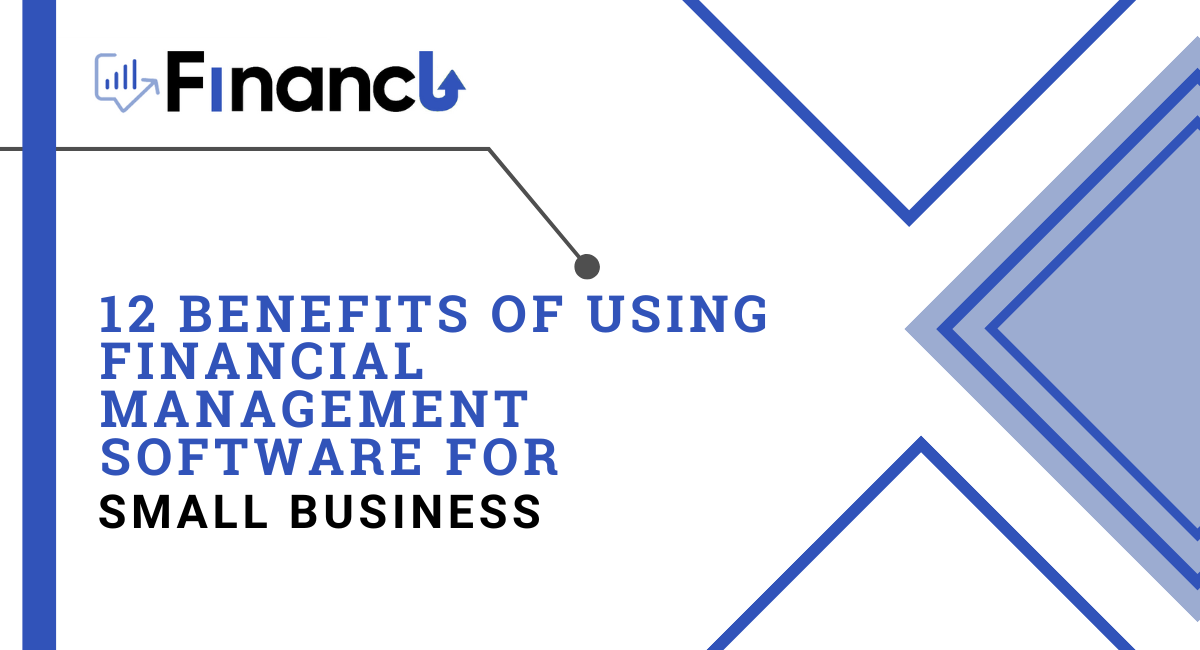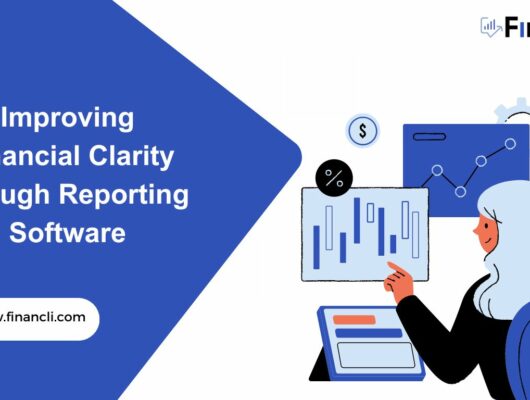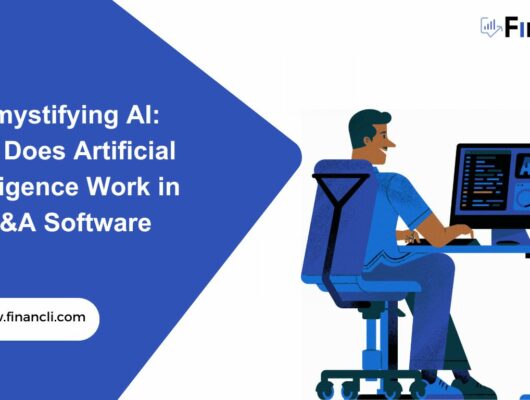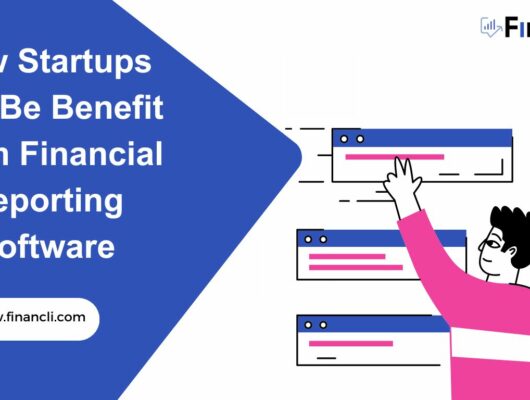
The novel coronavirus and associated lockdown drastically shifted business dynamics. The rise in online shopping and services trends paved the way for small businesses to offer their services and reach a larger market.
However, small business owners perform several duties at once. The trickiest one is the duty of an accountant. Thus, financial management software came to the rescue.
Financial management software is a blessing in disguise, especially for small businesses. Their features and easy financial reporting make running a business much more manageable. This article mentions some significant benefits of using financial management software, particularly for small businesses.
1. Centralized Financial Reporting

Accountants and CFOs can understand the headaches financial data collection causes. First, financial experts invest considerable time gathering data from multiple sources. Then, after consulting bank statements, excel sheets, and other transaction records, they compile reports.
However, small businesses are in a cash-saving mode. Therefore, they cannot hire financial experts. Also, the limited scale of their business does not allow them to avail of the services of a professional accountant. In these circumstances, accurate and timely financial reporting becomes a top concern for small and medium enterprises.
Financial management software for small businesses answers all such concerns. They eliminate the need to enter and update data across multiple platforms, such as excel and banking applications. They also allow users to download reports without accessing never-ending, detailed reports.
2. Automation

Freelancers and entrepreneurs wear many hats. They are their customer service representatives and accountants. They perform the functions of inventory managers and procurement specialists. So any automation brings relief in a sea of jobs and tasks.
Statistics report that only 20% of small businesses hire finance professionals to assist in financial matters and reporting. Because of the complex nature of finance-related tasks, automated financial management software is the best way out.
Financial management software tracks expenses, creates budgets and does financial analysis, all in an automated manner. These services relieve the burden off the shoulders of entrepreneurs who can avail of an automated financial service.
3. Efficient Budgeting

Small businesses are tight on finances. However, they must create and stick to operating budgets to intelligently manage their finances.
Financial management software for startups is an intelligent way of tracking expenses and streamlining spending. Reviewing their spending, business owners determine if their expenses are within set limits. Additionally, they can see whether their expenses align with their business goals and KPIs.
Again, these financial management tools eliminate the need for manual processes to create or manage budgets. Instead, they allow users to allocate their financial resources to key focus areas and track their financial activities.
4. Access to Accurate Information

To err is human. However, financial aspects do not have a margin for these human errors. The slightest error can cost a new setup its existence.
Several new businesses wrapped up in the initial years of their establishment because of poor financial decisions. Undoubtedly, erroneous financial data produces wrong decisions.
Inaccurate financial information reflects in multiple ways. They directly affect the business’s plans and strategies, audits, tax filings, and, thus, business health.
Small businesses are more exposed to faulty reporting risk than large organizations. Established companies have dedicated departments and hired professionals who oversee all financial aspects of the business. As a result, their financial reporting capabilities are better than those of an unprofessional.
On the contrary, small businesses neither have the personal expertise to handle finances nor have hired professionals. Yet, an updated and accurate financial insight is crucial, as it is the foundation for every financial decision.
Financial management software is the solution for such enterprises. This software provides error-free, accurate, and instant information at a single click. These technological systems work on focused and set parameters with little chance of deviations or faults. Their accurate information facilitates auditing and tax filing, too.
Additionally, these intelligent systems prevent data redundancies or duplication. Since most data seem similar, humans may mix the numbers or enter the same information twice. However, financial systems can prevent such occurrences and compile and accurately present data.
5. Facilitate Data-driven Decisions

Guesswork or “gut feelings” do not work well for making financial decisions. Instead, the effectiveness of a decision is based on it being backed by quantifiable data and accurate information.
Financial management tools present data based on facts and accurate information instead of guesses and “gut feelings.” This software’s timely information lets small business owners prepare for unwanted situations. They help answer the “what if” of business decisions and enable decision-makers to plan.
The revenue projection, break-even analysis, and other statements provide information backed by accurate numbers in an updated form. With every penny and spending documented, stakeholders better understand and plan things related to their money matters.
6. Reduced Operational Cost

Operational costs are the ongoing expenses that keep a business operating. Utility bills and building rents are examples of operational expenses for a company. Employee salaries are also included in operational costs since they are part of a business’s operations.
The field of financial reporting is highly professional, and certified professionals charge quite an amount for it. Thus, hiring a financial expert and their salaries is a rather hefty operational cost that most small businesses cannot bear. Since small enterprises are already short on money, having a professional on the team is no longer viable.
Financial management software is usually subscription based. Yet, their prices are affordable compared to having a hired financial professional on the team. Additionally, financial software does not require paid leaves or other monetary benefits. Instead, they extend services and benefits with their accurate and timely information.
7. Better Productivity

The most significant benefit of automation is time-saving. Financial management tools update all information on autopilot and perform all recurring tasks.
Several tasks of financial management are repetitive yet complex. For instance, calculating profits or balances, making reports, and presenting them in graphs require time. They also demand unwavering focus and attention to prevent mistakes or errors.
Financial management software promises productivity for the entire small business setup. As mentioned earlier, startup team members do not have defined job descriptions. They are already performing multiple tasks at once. These software share the load and reduce stress, improving the productivity of team members.
Even if a small business has a finance expert on the team, draining their energy into mundane tasks is not a good idea. Instead, the best utilization of their skill is to seek their opinions in creating financial plans and strategies.
8. Enhanced Financial Forecasting

Financial forecasting is a crucial practice influencing several decisions and strategies. Considering current situations, businesses must be able to predict their future plans and activities. However, this is possible only if and when the aspects of the current situation are accurate and updated.
Centralized and updated financial information lets business owners plan. They can use current numbers and statistics to predict future trends. The foresight of business health is an effective tool that encourages better decision-making and planning. Reporting and analytics features in these financial management software allow users to grasp their current financial standing and use it to predict future growth.
9. Compliance

Money is a sensitive matter. Monetary frauds and other forms of financial theft are a constant threat. To combat these vices, governments regularly update their monetary policies.
However, it is difficult for laypersons to stay updated with these changing regulations. Most entrepreneurs are people from all walks of life and are not well-versed with complex financial terms and procedures. There are better ideas than adding the burden of studying and implementing regulatory procedures to their financial matters. These entrepreneurs seem to tiptoe in a minefield of tax and strict regulations, constantly fearful of any penalties or fines.
Common business owners are unaware of financial regulations, let alone stay updated with them. However, financial software is different. They keep on updating their systems and layouts according to prevailing regulations. An updated system, and in an intuitive way, allows users to see all business aspects according to the latest regulations and file taxes accordingly.
For example, intelligent financial management software automatically updates the VAT calculation. As a result, small business owners can keep their profits or budgets from re-calculating their profits or budgets according to the new VAT. Instead, they can continue using the software with the new VAT percentage added by default.
Financial management tools also facilitate a smooth tax filing process. Since all financial aspects of a business are compiled and accurate, preparing taxes becomes a piece of cake. As a result, business owners can conveniently file for their annual taxes with no services of tax preparers.
10. Transparency

In financial management software, the software does data entry and computing instead of humans. A single technology prepares this software’s error-free data without human interference or meddling.
The absence of human interference provides surety to business owners that all information in the software is free of fraud. Furthermore, they know that their software will instantly notify them of any loopholes in any information.
Access to transparent financial information is crucial for making money-related decisions. Stakeholders and business owners have foolproof information before them that they trust and rely on. The sense of security and surety of transparency paves the way for better business practices and policies.
Not only this, transparent data facilitates a smooth auditing process. Some small enterprises are subject to annual or biannual audits. Any discrepancies in their financial records can cause heavy fines and even shut the business down. Therefore, having reliable financial management software becomes even more critical.
11. Data Security

Computer-based financial management software offers better data protection. They have more intelligent security than manual services with limited security capabilities.
Financial management software is equipped with several layers of security. These “layers” prevent hacking or data and financial information breaches. Undoubtedly, having information in excel sheets cannot offer the same security as this software.
Financial information stored locally is exposed to unauthorized access and meddling. In addition, miscreants can misuse or alter the data, causing considerable business loss.
Financial management tools are security systems that allow access only to authorized users. Some software can add team members, but even they require security measures. Automating information eliminates the chances of human interference with data.
12. Stress Relief

Finally, the most significant benefit of using financial management software is the relief it brings. Entrepreneurs do not have to worry about their money, which is the most worrisome aspect of any business.
Financial management software ensures peace of mind for users because of its features and performance. All data is present in a centralized layout. It is automatically entered, updated, and calculated. Business owners are assured of the accuracy and transparency of present data. They do not have to compile data into a single piece manually.
Small business owners run their businesses like a breeze, with reduced costs, better productivity, and tax compliance. In addition, they can access the best financial reporting features without paying CFOs or tax preparers hefty amounts. All these aspects bring immense relief and peace of mind to entrepreneurs.
Therefore the financial management software market is predicted to grow to 16.9 billion US dollars in 2031 compared to 3.7 billion US dollars in 2021.
The Bottom Line
Financial management software has gained immense popularity over the years, and for a good reason. Because of their ease of use, large corporations have shifted to these solutions. However, small businesses are unaware of financial management tools’ wonder and convenience.
The answer to your financial management concerns is Financli. We provide you with a robust financial planning and analysis software that offers tailored financial solutions to its users. Our software caters to the needs of small businesses in particular. So sign up today and reap the benefits of having your business’s best financial management software.






